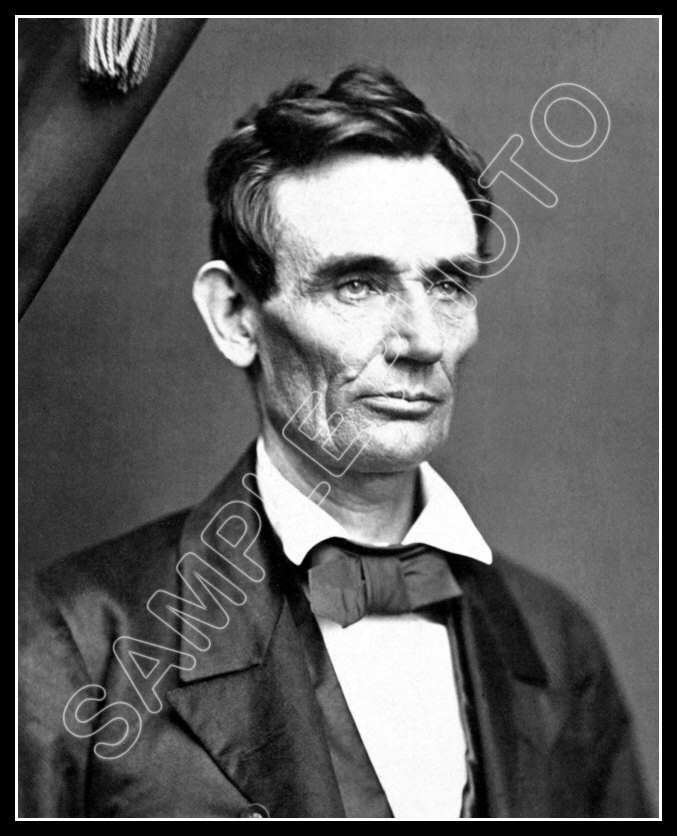BUY ANY TWO 8X10 PHOTOS AND GET ONE FOR FREE !!!!!!! 
ABRAHAM LINCOLN 
ABRAHAM LINCOLN - 1858 "SAMPLE PHOTO" Will Not Appear On Photograph CLICK HERE FOR THIS PHOTO IN 11X14 CLICK HERE FOR MORE ABRAHAM LINCOLN PHOTOS CLICK HERE FOR MORE PRESIDENT PHOTOS CLICK HERE FOR OUR 8X10 FREE PHOTO OFFER
This new 8X10 borderless photograph has been processed on
premium glossy photo paper. The frame is not included with the
photo. This photo will be shipped in a clear plastic sleeve and have
cardboard inserted in the shipping envelope to prevent bending.
CLICK HERE TO VISIT OUR STORE
HISTORIC IMAGES REPRINTED
THIS PHOTO IS BEING SOLD FOR PRIVATE USE ONLY We strive to offer the best images available in subject matter
and photo clarity. We would like to note clarity, glare, or other
imperfections are mostly dependent on the original source negative.
Some of our photos are reprinted from negatives that are 70 years
old or older and reflect the best quality obtainable. Negatives that are
fragile or are in poor condition have been digitized and cleaned
up to produce the best photographs possible. | | PAYMENT: |
| | | | | SHIPPING: | USPS First Class
| | | | | TERMS: | By placing a bid on this item you agree to the following terms. All items come from a smoke free environment. The winner will be contacted promptly and must reply within 7 days to expedite transaction & avoid NPB filing. Payment must be received within 10 days of notification. | Abraham Lincoln (February 12, 1809 – April 15, 1865) was the 16th President of the United States, serving from March 1861 until his assassination in April 1865. Lincoln led the United States through its Civil War--its bloodiest war and its greatest moral, constitutional and political crisis. In so doing he preserved the Union, abolished slavery, strengthened the national government and modernized the economy. Reared in a poor family on the western frontier, Lincoln was self-educated, and became a country lawyer, a Whig Party leader, Illinois state legislator during the 1830s, and a one-term member of the United States House of Representatives during the 1840s. He promoted rapid modernization of the economy through banks, canals, railroads and tariffs to encourage the building of factories; he opposed the war with Mexico in 1846.
After a series of highly publicized debates in 1858 during which he opposed the expansion of slavery, Lincoln lost the U.S. Senate race in Illinois to his archrival, Stephen A. Douglas. Lincoln, a moderate from a swing state, secured the Republican Party presidential nomination in 1860. With almost no support in the South, Lincoln swept the North and was elected president in 1860. His election prompted seven southern slave states to declare their secession from the Union and form the Confederacy. The departure of the Democratic politicians to lead the Confederacy gave Lincoln's party firm control of Congress, and no compromise or reconciliation was found regarding slavery. Lincoln explained in his second inaugural address: "Both parties deprecated war, but one of them would make war rather than let the Nation survive, and the other would accept war rather than let it perish, and the war came."
When the North enthusiastically rallied behind the national flag after the Confederate attack on Fort Sumter on April 12, 1861, Lincoln concentrated on the military and political dimensions of the war effort. His goal was to reunite the nation. His numerous complex moves toward ending slavery centered on the Emancipation Proclamation in 1863, using the Army to protect escaped slaves, encouraging the border states to outlaw slavery, and helping push through Congress the Thirteenth Amendment to the United States Constitution, which permanently outlawed slavery. Lincoln closely supervised the war effort, especially the selection of top generals, including commanding general Ulysses S. Grant.
An exceptionally astute politician deeply involved with power issues in each state, Lincoln reached out to "War Democrats" (who supported the North against the South), and managed his own re-election in the 1864 presidential election. As the leader of the moderate faction of the Republican party, Lincoln found his policies and personality were "blasted from all sides". Politically, Lincoln fought back with patronage, by pitting his opponents against each other, and by appealing to the American people with his powers of oratory. His Gettysburg Address of 1863 became the most quoted speech in American history. At the close of the war, Lincoln held a moderate view of Reconstruction, seeking to reunite the nation speedily through a policy of generous reconciliation in the face of lingering and bitter divisiveness. Six days after the surrender of Confederate commanding general Robert E. Lee, however, Lincoln was assassinated by an actor and Confederate sympathizer named John Wilkes Booth. Lincoln's death was the first assassination of a U.S. president. Lincoln has been consistently ranked both by scholars and the public as one of the greatest U.S. presidents. |
| | |